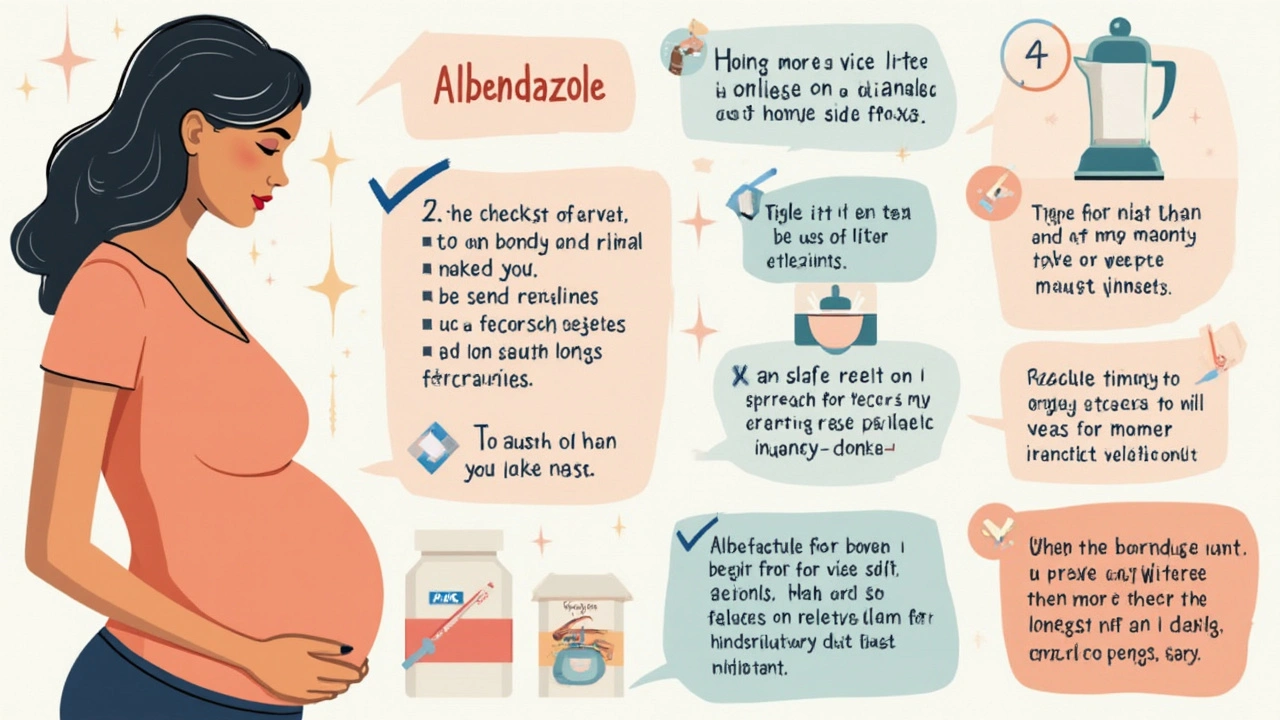Why Albendazole Comes Up During Pregnancy
Moms-to-be know they're bombarded with advice from everywhere—the OB’s office, well-meaning friends, even random strangers at the grocery store. Medication questions get especially loaded, and albendazole, a medication typically used to treat certain parasitic infections, comes up more often than most folks expect. Why does this specific drug end up on a pregnant woman's radar? Parasitic infections, like those caused by roundworms or tapeworms, might be rare in some countries, but they’re a big deal in parts of Asia, Africa, and Latin America. Doctors sometimes have to think quickly: is it riskier to leave a worm untreated, or to give this medication during pregnancy?
Some parasites can actually do real harm to both mother and baby. For example, the roundworm Ascaris lumbricoides can cause malnutrition or even block intestines, while hookworms are notorious for triggering iron-deficiency anemia. The decision whether to use albendazole isn’t just an academic debate; sometimes it’s a question of protecting both lives. Different experts and guidelines might seem inconsistent—one OB says hold off until the second trimester, another hesitates even then. But there’s a good reason for the debate: animal studies have shown high doses of albendazole cause fetal harm, but the real-world risks to humans are a lot fuzzier. And then, plenty of doctors in countries with those high rates of parasitic infections do prescribe it when the benefits are considered greater than the theoretical risks.
So, why doesn’t every doctor have the same answer? Part of it comes down to geography and risk. If you’re living in a region where a worm infection can make a pregnancy much more dangerous, you’ll hear a totally different take from your OB than someone in a suburb of Canada. That’s why it pays to have clear, honest communication with your healthcare provider, and to understand the actual facts behind the concerns over albendazole during pregnancy.
What the Studies Really Say About Safety
There’s a mountain of confusion online about whether albendazole is safe for expectant moms. Some blogs say “absolutely not,” while others make it sound as safe as prenatal vitamins. Here’s the science, stripped of drama. Albendazole falls into pregnancy Category C in the old U.S. FDA system—a designation based on animal studies showing some fetal harm at high doses, but with no large, controlled studies in pregnant humans. This usually means, “Caution: tread carefully, but don’t panic.”
There are good reasons for the caution. In rats and rabbits, high doses caused birth defects. But here’s the kicker—those doses were much higher than what humans actually use. When doctors look at real-world outcomes in places where albendazole is given to pregnant women by necessity, birth defects aren’t showing up in higher numbers than average. For example, in some African countries where mass deworming during pregnancy has become public health policy, tracking newborn outcomes just hasn’t turned up a scary pattern.
One large study from Nepal followed thousands of women treated with albendazole after the first trimester and tracked things like birth defects, preterm birth, and newborn health. No meaningful increase in risk popped up when compared to women who didn’t take the drug. The World Health Organization has also weighed in: for certain types of parasitic infections, treating with albendazole after the first trimester is actually recommended, because the risks from the worms themselves—especially severe anemia—can end up being far worse. For a deep dive on this balance and up-to-date medical recommendations, check out the thorough Q&A at albendazole pregnancy questions.
Still, medical science hates blanket statements. If you’re in the first trimester—a crucial time for fetal organ development—most OBs will suggest you wait, unless there’s a severe infection, because tiny risks are harder to rule out so early. That’s why doctors like to review each case. It’s not lack of knowledge—it’s personalized medicine, plain and simple.

Frequently Asked Questions from Expectant Mothers
If you’re pregnant and facing the idea of popping a pill for parasites, chances are you’ve got questions—and you want actual answers, not vague reassurance. Here are the questions OBs hear most, and what experienced doctors are really seeing:
- Is it ever safe to take albendazole while pregnant? Most doctors avoid it in the first trimester unless the patient has a dangerous infestation, but after 12 weeks, many guidelines permit it for specific, diagnosed infections.
- Can albendazole harm my baby? High-dose animal studies showed problems, but real-life data in humans doesn’t show a big increase in birth defects or preterm births. Most doctors focus on balancing infection risks versus medication risks.
- Are there alternatives? It depends on the parasite. For pinworms or roundworms, single-dose mebendazole is sometimes used as an alternative, but it has a similar risk profile. Pyrantel pamoate is considered safe in later trimesters for some worms.
- Should I delay treatment until after birth? Not always wise—some parasitic infections get worse, causing malnutrition or dangerous anemia. This can put both you and your baby at bigger risk than the medication.
- What side effects should I watch for? Nausea and mild stomach pain are common, but serious side effects are rare at prescribed doses. Allergic reactions are possible, though not typical.
- Can I breastfeed if I’ve taken albendazole? Tiny amounts may get into breast milk—your doctor may recommend pausing breastfeeding for a day or two, depending on your baby’s age and the infection type. Your OB or pediatrician will help sort the safest plan.
Doctors also field lots of questions about long-term effects. Most large studies so far haven’t found evidence that children exposed in the womb to a single treatment dose have developmental or growth problems later on.
Practical Tips: How to Talk With Your Doctor
Facing a prescription for albendazole can make pregnant women anxious—it’s totally normal to be worried about making the safest choice. Here are real-world strategies that put you in the driver’s seat at your OB appointment:
- Write down your questions before your visit. Don’t be shy about bringing a list—your concerns deserve answers.
- Ask about alternatives and timing. For certain non-urgent worm infections, your doctor might be able to wait until you’re in your second trimester or after delivery.
- Find out about the specific risk in your area. If you live where certain worms are a public health problem, your OB will have the latest recommendations that balance local risks and drug safety.
- Get clarity on what to expect next. If you and your doctor opt for treatment, ask what symptoms to watch for, and exactly when to call if you feel unwell after taking albendazole.
- Ask about follow-up lab tests. In some cases, checking for anemia and making sure the infection cleared is part of safe management.
And if you go home and still have lingering doubts, don’t be afraid to reach out again—even email or message can help. Doctors are used to questions about pregnancy medications; a good OB will walk you through your options until you feel sure.

Fact Checks and Everyday Realities from OBs
No mom wants to take a medication unless she absolutely has to. But ask any OB who’s practiced in parts of the world with high rates of worm infections—sometimes treating is the safer option. Take iron-deficiency anemia, for example. Severe cases double the risk of premature birth, and heavy worm infections can sap iron quickly. In high-risk areas, deworming during pregnancy can halve the rate of severe anemia. That’s not trivial.
Curious how often all this comes up? In the United States, most OBs see it just a few times a year. But in regions like Sub-Saharan Africa, WHO-backed campaigns bring up questions about albendazole several times a month. Doctors from countries like India and Kenya have published case reports and clinic data showing that single-dose albendazole, given in the second or third trimester, does not appear to raise birth defects above the population average.
| Country | Timing of Dose | Observed Birth Defect Rate | Noted Benefits |
|---|---|---|---|
| Nepal | After 12 weeks | No significant increase | Lowered anemia, improved infant birth weight |
| Kenya | After 14 weeks | No significant increase | Lowered anemia, reduced worm burden |
| Ethiopia | Second trimester and up | No significant increase | Maternal anemia reduction |
For expectant mothers worried about “what if I took a dose before I realized I was pregnant?” Most doctors say a single accidental early dose is not likely to cause harm, based on known case data. Still, your provider might want a quick follow-up ultrasound, just for peace of mind.
One last thing: don’t underestimate worms, especially if you have symptoms like ongoing stomach pain, unexplained tiredness, or signs of anemia. Treating a real infection safely is as much about being careful with medications as it is about not letting the problem get worse because of fear or misinformation. (And trust me, after two kids—my Ada once picked up a case of pinworms from a sandbox—here’s my advice: don’t ignore weird symptoms, and always double-check with your doctor if something doesn’t feel right.)


I was so scared when my OB suggested albendazole at 16 weeks. I cried for an hour. But then I read the Nepal study and realized the worms were stealing my iron faster than the pill could hurt my baby. I took it. My daughter is now 2 and thriving. You got this, mama. 💕